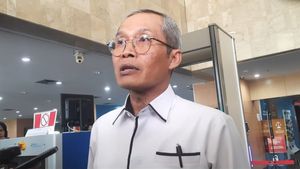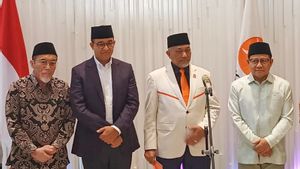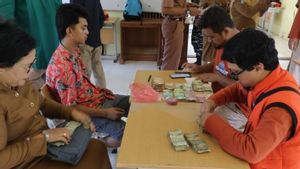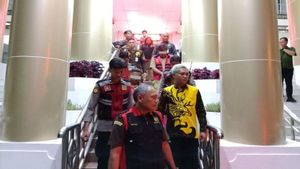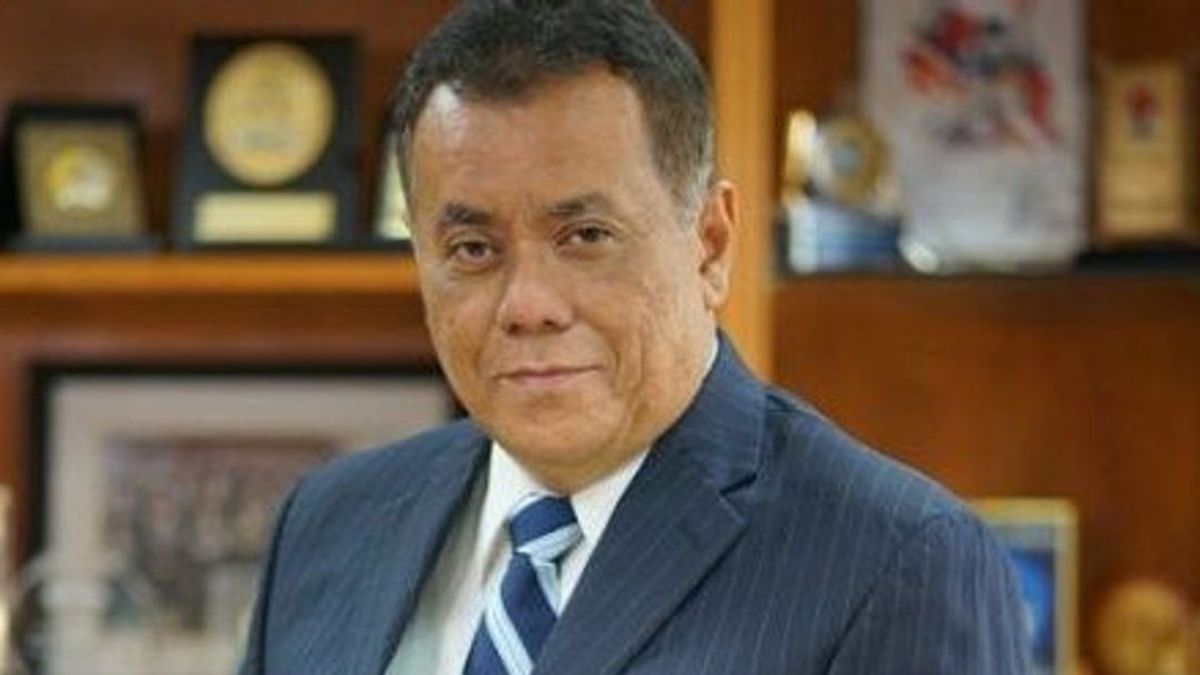
JAKARTA - The Chancellor of the University of Indonesia (UI) Ari Kuncoro is safer in holding dual positions. President Joko Widodo (Jokowi) has changed the rules that had disrupted his position. There are many things to explore. One of them is about the legality of subterfuge. Anxiety for a long time that finally peaked: legal is not always good.
The issue of Ari Kuncoro's dual position first surfaced at the end of last June. At that time, the University of Indonesia Student Executive Board (BEM UI) criticized President Jokowi, which they called 'The King of Lip Service.' The Chancellor then summoned a number of BEM members through a letter signed by Ari Kuncoro.
Ari Kuncoro became a polemic because of that, until the concurrent position he held as Chancellor of UI and commissioner of State-Owned Enterprises (BUMN) was revealed. A number of parties have voiced the pressure for Ari Kuncoro to leave his concurrent position. The opposite happened. Jokowi is now giving legality to the dual position held by Ari Kuncoro.
On July 2, Jokowi signed Government Regulation Number 75 of 2021 concerning the Statute of the University of Indonesia (PP 75/2021). This PP contradicts PP 68/2012 which prohibits concurrent positions for the rector. A number of parties criticized. An expert on constitutional law, Refly Harun, called this an illegal case that was justified.
Having a state in the way that Jokowi practices, said Refly, is also dangerous. Imagine, when there is a violation of a rule, it is not the rule that is enforced but rather the rule that is adjusted to the violation. This way of thinking is chaotic in a country that should be subject to the rule of law.
However, Refly said that having multiple positions not only violates the PP Statute of UI, but also violates the law. "But it's enough that the law is changed, so that what was previously haram becomes halal. Our country is extraordinary," said Refly on the YouTube channel, Refly Harun, Wednesday, July 21.
"For example, Law Number 25 of 2009 concerning Public Services. Article 17 letter a explains "implementers (public servants) are prohibited from concurrently serving as commissioners or administrators of business organizations for implementers who come from government agencies, state-owned enterprises, and regionally-owned enterprises. ."
Member of Commission III of the DPR RI, Arteria Dahlan, called this a shameful thing. Arteria, who is a PDIP politician, even called this a corrupt thing. Arteria also encouraged a number of parties, including students from the University of Indonesia (UI) to sue the PP signed by Jokowi.
"UI children must be smart in mind and smart in action. You can do judicial review of PP to the Supreme Court, sue the decree to the Administrative Court, report maladministration to the Ombudsman and if there is corrupt behavior, report it to law enforcement," said Arteria.
The specialty of Ari Kuncoro
The Indonesian Legal Aid Foundation (YLBHI) saw that Jokowi's amendment to the PP Statute of UI was carried out to protect the interests of Ari Kuncoro. There are several things that make Ari Kuncoro 'special'.
YLBHI Chair Asfinawati called Ari Kuncoro an important actor in the agenda for smoothing the Omnibus Law on the Job Creation Act. He said Ari Kuncoro was one of the Omnibus Law Task Forces on the Job Creation Law.
Ari Kuncoro's role, continued Asfinawati, is to control the Omnibus Law discussion within the UI. "The direction is clear and we are not surprised. Ari Kuncoro is an important actor in smoothing the agenda for the omnibus law (UU Cipta Kerja)," he said, Tuesday, July 20.
Ari Kuncoro's position in BUMN has been around for a long time, even before he took up the position of Deputy President Commissioner of PT Bank Rakyat Indonesia Tbk (BRI). In 2017 Ari Kuncoro was appointed as President Commissioner of PT Bank Negara Indonesia Tbk (BNI). Ari Kuncoro was appointed at the Extraordinary General Meeting (EGMS) November 2, 2017.
The decision was strengthened by the EGMS decision deed No. 2 dated November 2, 2017 and approved by the Financial Services Authority (OJK) on March 14, 2018. Ari Kuncoro replaced Hartadi A. Sarwono who was honorably dismissed. At the time of his appointment at BNI, Ari served as Dean of the Faculty of Economics and Business, University of Indonesia since 2013.
BNI said that the selection of Ari Kuncoro was carried out professionally with consideration of his capabilities. Then Ari Kuncoro was appointed Rector of UI on December 4, 2019. At the BNI General Meeting of Shareholders (GMS) held on February 20, 2020, BNI appointed former Governor of Bank Indonesia Agus Martowardojo to replace Ari Kuncoro.
When he was 'expelled' from BNI, Ari Kuncoro had already been proposed by BRI to become the deputy president commissioner. His appointment was the result of the decision of the BRI Annual General Meeting of Shareholders (AGM) which was held on Tuesday, February 18, 2020. This position is currently held by Ari Kuncoro.
Legal doesn't mean good
This is the culmination of skepticism about the formation of legal products. Often legal products are formed based on the interests of the authorities, not the public. Legal, but not necessarily good for society. Recently, for example, when a number of foreign nationals (WNA) from China entered Indonesia during the Emergency PPKM.
The Coordinating Minister for Maritime Affairs and Investment (Menko Marves) Luhut Binsar Panjaitan explained that the travel of foreigners was legal. Luhut said the foreigner's travel scheme has been regulated in the SE Task Force Addendum Number 8 of 2021. In the addendum the government details the rules and requirements for traveling for Indonesian citizens and foreigners from abroad.
Luhut, who led the Emergency PPKM implementation, also explained that foreigners entered through the Travel Corridor Arrangement (TCA) scheme. TCA is a scheme under the bilateral umbrella that allows citizens to travel from one country to another in special situations, in this context of a pandemic.
Drawn to a more distant time. When the polemic of the KPK Bill or the Omnibus Law bill was volatile, the government, through the mouths of a number of officials, also often mentioned things about legality. Even when the problematic law was passed, the government asked the public to take judicial review to the Constitutional Court (MK).
At that time, June 10, the Constitutional Court held a virtual review of Law Number 11 of 2020 concerning Job Creation against the 1945 Constitution. The agenda for the day was to hear information from the Indonesian House of Representatives and President Joko Widodo (Jokowi) regarding the regulation. As the President's representative, the Coordinating Minister for the Economy Airlangga Hartarto was present.
On that occasion, Airlangga submitted a request, one of which asked the Court to reject the formal test. Following is Airlangga's complete application:
a. Receive the president's statement in its entirety
b. Stating that the applicant has no legal standing
c. Refuse the application for a formal review of Law Number 11 of 2020 concerning Job Creation for all applicants pemohon
d. To state that Law Number 11 of 2020 concerning Ciptaker does not conflict with the 1945 Constitution of the Republic of Indonesia.

Trisakti University public policy expert Trubus Rahadiansyah agrees that legal matters are not always good. Good in this case is in accordance with the interests of society. What happened in the case of Ari Kuncoro is a clear illustration of how legal products are distorted no longer for the public but for the sake of power.
"Using the law to break the law," Trubus told VOI, Wednesday, July 21.
"There are three kinds of politics. How can people maintain and share power. The point is that there are three. If power is obtained, it is not right, then maintaining it is also not right," added Trubus.
This pattern of rule formation that turned from the public interest to the will of the authorities reminded Trubus of the New Order under Suharto's leadership. According to Trubus, the typical formation of such policy rules is closely related to the characteristics of an authoritarian government.
"So the authoritarian policy is like that. So power is used as the spearhead to achieve that power. The law is used to protect power. So it's like the song Bento Iwan Fals," said Trubus.
Like Refly Harun at the beginning of the article, Trubus also sees this as a dangerous way of statehood. This will set a precedent that is not impossible to happen again in the future. On the basis of legality the government can make rules at will. For this reason, many parties must re-look at the ethical context in making legal and policy products.
That way the legal products and policies that are made are not only legal but also good. "In the legal context, we will talk about right and wrong. Now, if it is ethics, we will talk about whether it is good or not," Trubus said.
*Read other information about LAW or read other interesting articles from Wardhany Tsa Tsia, and Yudhistira Mahabharata.
Other BERNASThe English, Chinese, Japanese, Arabic, and French versions are automatically generated by the AI. So there may still be inaccuracies in translating, please always see Indonesian as our main language. (system supported by DigitalSiber.id)



